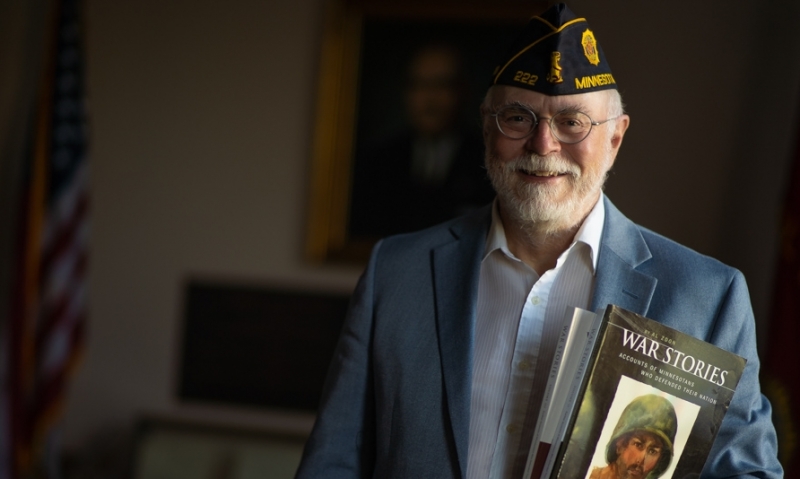
Minnesota Legionnaire’s books of service histories have raised thousands of dollars.
Al Zdon is a big fan of The American Legion and its history. The 22-year Legionnaire – and communications director for the Department of Minnesota – is also serving as chairman of the department’s centennial committee, and holds a position on the national 100th Anniversary Observance Committee.
But he is also a fan of individuals, and their histories. To that end, he has composed three volumes of “War Stories: Accounts of Minnesotans Who Defended Their Nation.” The stories are taken from features he wrote for the department newspaper. Taken between them, the volumes have raised thousands of dollars for both Legion youth programs and a state World War II memorial.
Zdon spoke with The American Legion about the process, and why holding on to history is so important.
How long have you been active in department initiatives/offices/etc.?
I was the editor of the Hibbing, Minn., Daily Tribune for 20 years. I was hired in 1996 by the Minnesota American Legion to be the communications director and department newspaper editor.
Where did the idea for these books come from?
When I took over the Minnesota Legionnaire, I knew I had a problem. I had been receiving the newspaper for several years, and it kind of made a beeline from my mailbox to the circular file. If I wasn’t reading it – and I love newspapers – I knew it needed some improvements.
So I did all the usual stuff like redesign it, add more news, and make it more valuable for the veterans who read it. One of the changes was to start writing feature stories, often two or three tabloid pages long, about Minnesota veterans who had served in the wars. It took a long time, but the stories started to catch on with the readership. When they announced they were going to build a World War II memorial in Minnesota, someone suggested to me that we collect a bunch of the stories, put them in a book and sell the book to raise money for the memorial. It worked, and we raised about $70,000 for the memorial. That book is now in its fourth printing. Not big printings, but we keep running out of them.
How long does it take to put one together?
You’d think that with all the stories already written, it would be a breeze to just collect them into a book. I’ve learned otherwise. I hire two proofreaders just to untangle my brilliant prose, and also a professional designer and an artist to do the cover and the interior of the book. I desktop-publish the whole thing to save money. It will take me more than two years to do a book once the process is started.
How did you collect the stories? Who did you look for?
I do stories on all the wars, but I’ve always concentrated on the World War II guys and gals because I could see that they would not be with us much longer, and once those stories are gone they’re gone. The idea was to preserve as many stories in a permanent form as possible. I’ve done about 200 stories over the years.
How much has been raised so far? Where is the money going to?
As I said, about $70,000 for the World War II memorial here at the Minnesota Capitol. About $16,000 has been raised by the second book for Legion youth programs. We’re still trying to pay for the third book, but once we achieve that the proceeds will also go to Baseball, Boys State, Girls State, Legionville Camp and the Oratorical Contest.
Are there more volumes to come?
I call it a trilogy, because I’m pretty sure this will be the last book. There are other projects I’d like to work on while I’m still on this side of the grass. But I also hope to put all the stories on our website for permanent access. The cloud is probably the real permanent storage place now.
How do you see this as connecting to the Legion’s centennial?
It has no real connection with the centennial, except as a reminder of the rich history our veterans have provided us.
What has been the response?
People seem to like the books. It’s been my goal to let the veterans tell their own stories as much as possible. I can provide a framework, but I want their voice to come through as much as possible. I’ve found that many veterans are great storytellers, and they have a terrific sense of humor.
What do you see as the best way to get service experiences recorded so that they’re not lost to history?
I always encourage veterans to write or record their own experiences. The veterans I’ve known who have done this have enjoyed the experience, and their families will always have this important piece of history. Strangely enough, my dad would never talk about his experiences, nor would he let me tape him. So I know more about the 200 people I’ve interviewed than I do about my dad. It’s very sad, and I think that’s the story in many families. We have to preserve these stories when we have the chance.
What do you think is most important about this project?
As I said, when I started it was mainly a plan to increase readership of the newspaper. I figured veterans would like to read about veterans. But as time went by, and the books started coming out, the project took on a life of its own. I’ve been a newspaperman for over 50 years, if you count my high school writing, and I’ve done everything from interview presidents to write a lengthy report about the death camps in Poland. But I consider these stories as the most important project of my professional life.
The three “War Stories” volumes can be ordered at www.mnlegion.org.
- Honor & Remembrance

